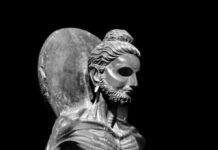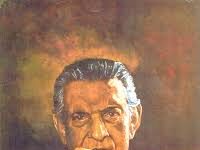 Mayandi Koththan left his village to ‘Madras’ in search of a livelihood. For three generations, his ancestors had built the houses in that village. In those small houses, children were born, urinated on the front porches, grew up, got married, discovered life in inner chambers, experienced flavors in the kitchens, aged, weakened, and finally collapsed on the same porches. Even the multi-stories in the village were built by his ancestors.
Mayandi Koththan left his village to ‘Madras’ in search of a livelihood. For three generations, his ancestors had built the houses in that village. In those small houses, children were born, urinated on the front porches, grew up, got married, discovered life in inner chambers, experienced flavors in the kitchens, aged, weakened, and finally collapsed on the same porches. Even the multi-stories in the village were built by his ancestors.
When he set out for Chennai, Maayandikothan made sure to take his spirit level (measuring tool) with him. It was the same spirit level used by his father and grandfathers. They had used it to understand the leveling of the land, aligning the earth perfectly with the sky. The village itself stood firm, resting on those precise measurements.
Famine had struck the village, and one by one, people had left. Abandoned houses stood hollow, and the scorching summer sun mercilessly beat down on them. Maayandikothan, too, was meant to leave. But he had the spirit level in his hand—the measuring tool that showed the leveling balance between the earth and the sky. Maayandikothan held the directions in his hands.
Maayandikothan arrives in Chennai. How tall the buildings are! It’s as if houses are stacked one on top of the other, like the entire village has been lifted and placed in layers. Skyscrapers that touch the sky! Maayandikothan’s heart swelled with pride. After all, weren’t these the achievements of his lineage as masons? Surely, there would be plenty of work for him in those buildings too, right?
Just as he had expected, Maayandikothan found work. The city kept on constructing building after building. No matter how much was built, the city always had more land and sky left untouched. Maayandikothan became one of the masons. But he soon realized that here in the city, the masons didn’t really build the houses. It was the engineers, dressed in shirts and pants, who did that. They sketched the calculations for the buildings on blueprints. They decided what should go where. The masons were merely the laborers carrying out the commands of these engineers.
Mayandi Koththan is astonished. How can these people, who have never touched the soil, build a structure? He learned the secrets of construction by wandering and swimming through the soil. These people build structures without even dirtying their shoes. How can they understand the soil, and how can the soil understand them? Mayandi Koththan couldn’t trust them. He secretly measures the buildings himself. With his own spirit level, he evaluates the buildings.
Astonishingly, all the buildings in the city are constructed with a slant. Mayandi Koththan keeps looking again and again. The ground has sunk, the roofs have caved in, and the frames have fallen apart. He knows that the building is going to collapse. He runs to tell the engineers. They mock him. “Koththan, go away… all your measurements are outdated. Today, everything is measured differently. Now, machines do the measuring… we know what we’re doing.” He was told.
Mayandi Koththan pleads, folding his hands and begging. “Sirs, all the buildings are going to collapse. The measurements are not right. Don’t believe what Koththan says, but listen to what my father’s and grandfather’s spirit level says.” But they call him a madman. “Just do the job you were told, Koththan,” they scolded him. Koththan, in response, turns slightly delusional. He starts measuring every house, checking every building. Yes, the entire city is indeed collapsing!
One day, the secret dawns on him. The problem lies with his spirit level. Its reading doesn’t work correctly in the city. That spirit level was calibrated for measuring the damp, clay walls of the village. There’s no moisture within the city’s walls. When measuring the dry cement walls, his spirit level wavers and gives wrong readings. In Mayandi Koththan’s perception, the entire city seems to hang crookedly in the sky.
Mayandi Koththan thinks of throwing away his spirit level, but he can’t bring himself to do it. After all, it’s the same spirit level used by his father and grandfather. Holding it close to his chest, Mayandi Koththan runs away from the city.
This is the story “Mayandi Koththanin Rasamattam” written by one of Tamil’s greatest literary figures, Konangi. I am not going to delve into or explain anything within this story. I simply want to highlight that the word ‘rasam’ also means essence. Is a grand new world emerging before our eyes, making our essence irrelevant? A world devoid of moisture. A world where all calculations of moisture go wrong?
Long ago, my friend Vasanthakumar and I were walking along the Triplicane road late one night when a scene caught our eyes. A beggar woman was warding off evil’s eye from her child by burning a small piece of camphor. Every day, that child stands in the scorching heat at the crowded bus stop, half naked with shaggy hair, begging from hundreds of people. Yet, to its mother, isn’t it her dearest life? For a moment, my heart swelled with emotion.
It felt as though they had created a village and were living in it at the corner of that vast city street. Every time I pass through the slums of Chennai, this thought arises — that it is a miniature village. The village conversations, village laughter, village quarrels. A village is the last leaf sprouted from an ancient cultural tree spanning thousands of years. The city is a monstrous beast. Those leaves are its food. Day and night, it devours villages.
I pondered how many villages the city of Chennai consumes every day. S. Ramakrishnan, in an essay, notes that both Chennai Central and Egmore railway stations constantly pour rural people into Chennai, much like pouring grain into a mill. Every day, people arrive with a mixture of despair, hope, and wonder, only to disappear into the city. He says that even Pudhumaipithan, Vannadilavan, and he himself were among those who arrived in this way.
Last year, when I visited America, I saw many “Mayandi Koththans” at the doorsteps of the towering buildings of New York City. Their calculations had failed in that city. The New York they see is dangerously collapsing. They are called by many names there—Tramps, Hippies. But the term “Homeless” is the most meaningful. A home is not just a building; it is a place of rest, a point where relationships gather. That is what they lack.
Many of them are drug addicts. Some are madmen. Others stubbornly reject the loud urban culture. Can we call them outsiders? There are always people on the periphery of the cultural structures we create. Many, like Mayandi Koththan, have lost their sense of measurement. There are also those who stand beyond the calculations we impose. The city can be built by hundreds of intricate machines, but only Mayandi Koththan’s spirit level understands the essence of it all.
Any culture greatly depends on the voices of those who stand outside it. Cultures that ignore these voices have already begun to falter. The voice of the outsider, saying that our calculations and grand structures are flawed according to his measure, is indeed the voice of truth.
Truth has always stood outside the structures created by authority. It comes with a different spirit level, standing at the gates of our mansions, calling out, “Tax collectors, benefactors, woe unto you!” It proclaims, “I firmly say that all these buildings you construct will not stand firm without a solid foundation.” Many times, we immediately seize it and crucify it.
But the voice of truth never fades.
A story unfolds. The Mahabharata war has ended. It is the day Dharma wears the crown. Gold and wealth are piled in the Hastinapura palace. Blood stains are washed away, and the widows are pushed to corner rooms, as the city prepares for celebrations. Everywhere, desire awakens in joyous anticipation.
Only one person is not able to join in the celebrations. His name is Dheeshanan. Sharp eyes from the texts he studied disturb his peace. He heads towards the city square. There, people gather around Dharma to receive gold and wealth as gifts. A single uproar fills the air. In the crowd, he spots an old man—a Shaivite with matted hair and a long beard, holding a yogic staff. He stands adorned in a loincloth made of bandicoot skin, smeared with ashes, a striking figure amidst the throng.
The crowd fear him, and he is never allowed inside the city. He resides in the cremation grounds, spreading ‘Charvaka’ wisdom among the souls of the departed. He survives by consuming the offerings meant for the dead. Today, however, since the city is in celebration, he is granted permission to enter. It is a tradition.
Standing on the street corner, planting his staff in the ground, the Charvaka calls out, “There is no God. There is no liberation. The four truths—God, liberation, righteousness, and pleasure—are all lies. Only the pleasures of the world, known as desire, are the true purpose of life. Do not forsake the joys of life for an unattainable liberation. Enjoy life. Live together.”
Everyone flees in fear from him. He approaches the palace courtyard of Dharma like a lion. There, he joins the queue where people line up to receive goodies from the king. The line moves forward, and he stands before Dharma. The radiant Dharma, adorned with a shining crown, scoops up handfuls of gold and places them in Charvaka’s hands. The Charvaka looks at the coins, sniffs them briefly before letting them fall to the ground.
Dharma hesitates for a moment but then scoops up more gold to give. Again, Charvaka lets it fall to the ground. This time, Arjuna steps forward in anger and asks, “What do you want?” Charvaka replies, “This gold is stained with blood.” Arjuna takes up his bow. Dharma intervenes, saying, “Oh, Charavaka, let me give gold from a different lot.”
“Dharma, do you have any gold that isn’t stained with blood?” asks Charvaka. Dharma is left speechless. In a fit of rage, Arjuna yells, and the assembled priests boil over with anger, pouring ghee onto Charvaka and setting him ablaze. Charvaka burns in the courtyard of authority like a torch of fire.
After everyone has left, Dheeshanan stands in the courtyard, trembling as he reflects, “What was the purpose of the one who declared that desire is the only truth? Why did he come to the authority’s courtyard and cry out? Why did he give his life?” just then Dheeshanan feels something brush against his leg and, thinking it’s a snake, he flinches for a moment. It turns out to be Charvakan’s yogic staff. He picks it up.
This is the story “Thisaigalin Naduvae” that I wrote twenty years ago. The voice of the outsider, standing before the towers of authority and calling out, is the voice of truth. It is the voice of art and literature. He may be a solitary outcast or a persecuted individual, but his voice can resonate softly.
But it only takes that touch on the surface of conscience to shake things up. That voice alone can say that there is no moisture in your foundations and that all your towers are leaning.
For the past fifty years, artistic and literary thought in our cultural environment has developed within a very small circle. Outside that circle, our consumer habits and politics have flourished chaotically, rooted deeply throughout the world. Against that immense force, this small voice continues to struggle tirelessly.
That is what we call a magazine. The works of magazines like Kerala Kavitha, Anveshanam, ஜயகேரளம், Samiksha, Manikodi, and KaSaTaTHaPaRa are what we proudly claim as our own today. Let us consider the other pioneers as well today.
That is why every writer who writes in Tamil dreams of running their own little magazine. I, too, have run a magazine called Solputhithu. It was nothing but the enthusiasm to make myself a small drop in the vast tradition of little magazines.
A circle of friends forms around a small magazine. The magazine continues to exist as long as the spirit of that group remains intense. That intense spirit translates into action. Yes, a small magazine is an external form of intensity. Whichever intensity gives rise to art, literature, and thought, the magazine is its physical form.
Here we are celebrating the anniversary of a small magazine. This magazine has persevered with unwavering dedication. A lone voice. A voice that has been pushed to the margins. Yet, it remains the uncompromising voice of righteousness. The enduring voice of literature.
May it triumph!
[Speech delivered at the release event of Anveshi magazine at Kollam on 12-03-2011]
Original article:
ஈரம்












